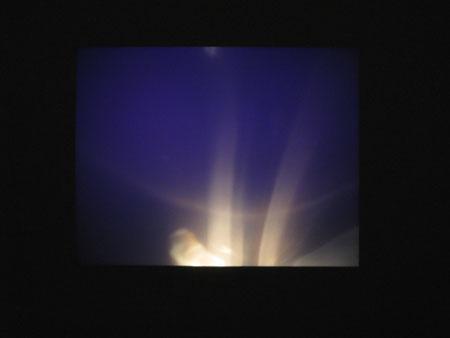I had a job many years ago where all I did, all day long, was pay the garbage bills for every Circle K in the country. When I wanted to get away from my cubicle for a few minutes to myself, the only place I could go was… a Circle K in the building’s lobby. Outside the lobby doors was nothing more than an industrial park, scored by the buzz of a nearby freeway.
Now when I need a break, I have an entire encyclopedic museum just upstairs. Most recently, I’ve been paying visits to Thomas Wilfred’s Opus 162 (1967–68).
Wilfred was from Denmark and was a pioneer of light art. He created a device he called a “color organ,” which he used to “orchestrate” the qualities of light. Where a composer might play with key, melody, or tone, Wilfred composed reflection, refraction, and color. The work is embedded into a wall by a staircase leading up to the European galleries, with a few comfy chairs in place so one can settle in and watch the soundless composition unfold.
Wilfred’s Opus evolves over time. I don’t really know how long it lasts—a few minutes? An hour? More? No matter: if you can allow your mind and body to quiet and let yourself watch the light, it seems to transform constantly yet languidly.
In the beginning I feel like I’m seeing the tip of a candle flame, its stick cropped out of the frame. Later it feels like looking at the sunrise, or the aurora borealis, or smoke wafting through the air. I can imagine the machinery behind the screen which is somehow manipulating the shapes. An intense point of light moves up the screen at some points, left to right at others.
The more I stare the more I feel like a kid gazing up at the clouds, manipulating them into things I recognize. In the light I’ve seen silk, a spider web, a jellyfish. Eventually it gets to feeling like I’m looking at pictures of the cosmos transmitted from the Hubble Space Telescope.
In time I no longer feel like I’m looking at something but rather looking through something. The screen on the stairs becomes a kind of window. I feel the impulse to reach into it—and with that thought I suddenly feel like maybe I am inside of it. Wilfred’s Opus ceases being an object. It’s all around me.
And with a shake of my head and a sigh, I return from Planet Wilfred, back to my office.









